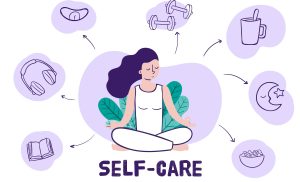How To Use Journaling As A Self-care Tool For Personal Growth?
Are you looking for a simple and effective way to prioritize self-care and foster personal growth? Look no further than the powerful practice of journaling. By putting your thoughts and feelings onto paper, journaling offers a profound form of self-expression and reflection. In this article, we will explore the various ways in which journaling can serve as a valuable tool for cultivating self-care and promoting personal growth. Whether you are a seasoned writer or a complete novice, this article will provide you with practical tips and insights for harnessing the transformative power of journaling.
Benefits of Journaling for Personal Growth
Enhances self-awareness
Journaling is a powerful tool for enhancing self-awareness. When you put your thoughts and emotions onto paper, you gain a clearer understanding of who you are and how you think. By reflecting on your experiences and inner dialogue, you become more attuned to your values, beliefs, and patterns of behavior. Journaling allows you to explore your thoughts without judgment, which can lead to self-discovery and personal growth.
Reduces stress and anxiety
Writing in a journal can be a cathartic and therapeutic practice. It allows you to release pent-up emotions, worries, and stressors by putting them into words. By expressing your thoughts and feelings on paper, you can gain a sense of relief and release. This process helps to reduce stress and anxiety, promoting a greater sense of calm and overall well-being.
Improves problem-solving skills
Journaling can also enhance your problem-solving skills. When you have a challenge or dilemma, writing about it in your journal helps to clarify your thoughts and generate new insights. Through introspection and reflection, you can identify possible solutions and evaluate their pros and cons. Journaling provides a safe space to brainstorm ideas and work through problems, which can lead to improved decision-making and problem-solving abilities.
Promotes emotional healing
Writing about painful or traumatic experiences in a journal can be a healing process. By processing your emotions and experiences through writing, you can gain a sense of closure and release. Journaling helps you to confront and make sense of difficult emotions, allowing you to heal and move forward. It provides a safe outlet to express your feelings and emotions, promoting emotional well-being and growth.
Fosters creativity and mindfulness
Journaling encourages creativity and mindfulness. By engaging in the act of writing, you tap into your creative side and explore your imagination. Writing can be a form of self-expression, allowing you to tap into your unique voice and ideas. Additionally, journaling promotes mindfulness by bringing your attention to the present moment. As you write, you become more fully engaged in the process, fostering a greater sense of mindfulness and self-awareness.
Tracks progress and goals
Journaling allows you to track your progress and goals. By documenting your experiences, achievements, and setbacks, you can reflect on your growth over time. Journaling provides a record of your personal journey and serves as a reminder of how far you’ve come. It also helps you stay focused and accountable to your goals, as you can review your journal entries and track your progress towards them.
Boosts self-confidence
Writing in a journal can boost your self-confidence. As you reflect on your accomplishments and personal growth, you reinforce a positive self-image. Journaling allows you to recognize and celebrate your strengths, which in turn boosts your confidence and self-esteem. By documenting your achievements and successes, you remind yourself of your capabilities and build a sense of self-assurance.
Enhances decision-making abilities
Journaling enhances decision-making abilities by providing a space to think through choices and weigh the potential outcomes. By writing down the pros and cons of different options, you gain clarity and perspective. Journaling helps you explore your values and priorities, enabling you to make decisions that align with your authentic self. By reflecting on past decisions and their consequences, you can also learn from your experiences and improve your decision-making skills.
Strengthens communication skills
Writing in a journal can strengthen your communication skills. As you express your thoughts and feelings on paper, you develop the ability to articulate your ideas and emotions more clearly. This skill carries over to your interpersonal relationships, as journaling helps you practice effective self-expression. By honing your communication skills in your journal, you can improve your ability to communicate with others in a more assertive and authentic manner.
Promotes introspection and reflection
Journaling promotes introspection and reflection. By taking the time to write and reflect on your thoughts and experiences, you gain deeper insight into yourself and your life. Journaling encourages you to ask important questions, explore your beliefs and values, and reflect on your personal growth. By engaging in this introspective process, you can gain a greater understanding of yourself and make more intentional choices aligned with your values and goals.
Choosing the Right Journaling Method
Free Writing or Stream-of-Consciousness Writing
One of the simplest and most popular journaling methods is free writing or stream-of-consciousness writing. This involves writing continuously without censoring or filtering your thoughts. By allowing your thoughts to flow freely, you can access your subconscious mind and gain clarity on your thoughts and feelings. Free writing is especially beneficial for exploring emotions, generating new ideas, or releasing negative thoughts.
Guided Journaling Prompts
Guided journaling prompts provide specific questions or topics to write about. These prompts can help you explore specific areas of your life, such as relationships, self-care, or personal goals. By using prompts, you can dive deeper into certain areas of your life and gain valuable insights. Guided journaling is a structured approach that can be particularly helpful for those who prefer specific direction or need a starting point.
Bullet Journaling
Bullet journaling is a popular method that combines journaling, planning, and organization. It involves using bullet points, symbols, and short phrases to quickly capture thoughts, ideas, to-do lists, and goals. Bullet journaling allows for flexibility and customization, making it a versatile method for tracking various aspects of your life. It can be a helpful tool for both organization and personal growth.
Gratitude Journaling
Gratitude journaling involves regularly writing down things you are grateful for. This practice shifts your focus towards positivity and helps cultivate a mindset of gratitude. By acknowledging and appreciating the good in your life, you can experience increased happiness, contentment, and overall well-being. Gratitude journaling can be a standalone practice or incorporated into other journaling methods.
Morning Pages
Morning Pages, popularized by Julia Cameron in her book “The Artist’s Way,” involve writing three pages of stream-of-consciousness writing first thing in the morning. This practice helps clear your mind, release any mental clutter, and set the tone for the day ahead. Morning Pages serve as a brain dump, allowing you to start your day with a clear mind and open space for creativity and productivity.
Dream Journaling
Dream journaling involves recording your dreams immediately upon waking. By documenting your dreams, you can gain insight into your subconscious mind and explore your feelings and emotions on a deeper level. Dream journaling can help you uncover patterns, symbols, and messages that may be significant to your personal growth and self-understanding.
Reflective Journaling
Reflective journaling focuses on introspection and self-reflection. This method involves writing about your experiences, thoughts, and emotions and then reflecting on their meanings and implications. Reflective journaling promotes deeper self-awareness and can be a valuable tool for personal growth and self-discovery.
Artistic Journaling
Artistic journaling involves combining writing with various art forms, such as drawing, painting, collage, or mixed media. This method allows for more creative expression and can be particularly helpful for those who find it challenging to express themselves solely through words. Artistic journaling taps into your creativity and can unleash new insights and perspectives.
Digital Journaling
Digital journaling involves using technology, such as a computer, smartphone, or tablet, to write and store your journal entries. This method can offer convenience, organization, and accessibility. Digital journaling tools often provide additional features such as the ability to add images, audio recordings, or searchable keywords. Digital journaling can be ideal for those who prefer typing, want to easily search through their entries, or value the security and privacy features offered by digital platforms.
Travel Journaling
Travel journaling is a method specifically focused on documenting your travel experiences. Whether you’re exploring a new city, hiking in nature, or immersing yourself in a different culture, travel journaling allows you to capture your adventures, memories, and reflections. This method helps you savor your travel experiences, gain new perspectives, and preserve the details of your journey for future reflection and personal growth.
Setting Up a Journaling Routine
Designating a Sacred Space
Creating a designated sacred space for your journaling practice can help set a special atmosphere conducive to reflection and self-expression. Your sacred space can be a comfortable corner of your home, a cozy nook in a café, or a peaceful spot in nature. Personalizing this space with meaningful objects or decorations can enhance its significance and make it feel more inviting and inspiring.
Establishing a Consistent Time
Establishing a consistent time for journaling can help make it a regular habit. Choose a time of day when you are most likely to feel relaxed and focused. Whether it’s in the morning, during a lunch break, or before bed, setting aside dedicated time for journaling signals to your mind and body that this practice is a priority.
Selecting the Right Tools
Choosing the right tools for journaling can make the experience more enjoyable and effective. Some prefer classic pen and paper for the tactile experience and freedom of expression it offers. Others may opt for digital tools that provide convenience and organization. Experiment with different types of pens, notebooks, or digital journaling apps to find what best suits your preferences and needs.
Creating a Comfortable Atmosphere
Creating a comfortable atmosphere for journaling can enhance your focus and relaxation. Consider factors such as lighting, temperature, and background noise. Adjust the lighting to a level that feels soothing to your eyes, ensure a comfortable temperature, and minimize distractions to create a calm and inviting environment.
Setting Realistic Goals
Setting realistic goals for your journaling practice can help maintain motivation and direction. Start with achievable goals, such as writing for a set amount of time each day or documenting specific aspects of your life. Gradually increase the challenge or complexity of your goals as you become more comfortable and committed to the practice.
Establishing a Journaling Habit
Consistency is key when it comes to journaling. Establishing a journaling habit requires dedication and discipline. Treat journaling as a non-negotiable part of your routine and commit to making it a regular practice. Over time, it will become a natural habit that you look forward to and rely on for personal growth and self-care.
Experimenting with Different Techniques
Don’t be afraid to experiment with different journaling techniques and methods. You may find that certain techniques resonate more with you or provide better results. Explore various journaling styles, prompts, or creative approaches to keep your practice engaging and diverse.
Finding Personal Motivation
Finding personal motivation to journal can help sustain your practice. Reflect on your reasons for journaling and the benefits it brings to your life. Whether it’s for personal growth, self-reflection, or stress relief, remind yourself of the value and importance of your journaling practice. This will encourage you to prioritize journaling and keep the momentum going.
Overcoming Writer’s Block
Writer’s block can happen to anyone, but it doesn’t have to hinder your journaling practice. When you’re feeling stuck, try free writing or stream-of-consciousness writing to get your thoughts flowing. Use prompts to kickstart your writing or incorporate different writing techniques, such as visualization or storytelling. Remember that there are no rules to journaling, and the act of writing itself is what matters most.
Maintaining Journaling Consistency
Consistency is essential for reaping the benefits of journaling. Even on days when you don’t feel motivated or inspired, make an effort to sit down and write something. Commit to regular journaling sessions to maintain the habit. Even just a few minutes of writing each day can make a difference in your personal growth and self-reflection journey.
Writing Techniques to Enhance Personal Growth
Self-Reflection Prompts
Self-reflection prompts can help guide your journaling practice and foster deeper introspection. They prompt you to explore your thoughts, feelings, and experiences in a more focused and structured way. Consider prompts such as “What am I grateful for today?” or “What are some limiting beliefs holding me back?” to spark self-reflection and personal growth.
Gratitude Practice
Practicing gratitude through journaling involves intentionally focusing on and appreciating the things you are grateful for in your life. Take time each day to write down three or more things you are grateful for. This practice cultivates a positive mindset, increases happiness, and boosts overall well-being.
Brainstorming
Journaling can be a powerful tool for brainstorming and generating new ideas. Use your journal to jot down spontaneous ideas, whether it’s for personal projects, creative pursuits, or problem-solving. Allow your thoughts to flow freely and explore different possibilities without judgment.
Mind Mapping
Mind mapping is a visual technique that involves creating a graphical representation of your thoughts, ideas, or concepts. Start with a central theme or idea and branch out, connecting related thoughts or subtopics. Mind mapping helps organize and visualize complex ideas, fostering creativity, and enabling you to see connections and patterns.
Freewriting
Freewriting is a technique that involves writing continuously for a set period without worrying about grammar, spelling, or punctuation. By allowing your thoughts to flow freely, you tap into your subconscious mind and access deeper insights and ideas. Freewriting is a powerful tool for creative exploration, self-expression, and overcoming writer’s block.
Goal Setting and Action Planning
Journaling can be an effective tool for setting and achieving goals. Write down your goals in your journal, break them down into smaller, actionable steps, and track your progress along the way. Regularly revisit your goals and make adjustments as necessary. Journaling helps you stay accountable, motivated, and organized on your path to personal growth and success.
Visualization and Manifestation
Visualization and manifestation involve using journaling to create a clear mental image of your goals, desires, and dreams. By writing down detailed descriptions of what you want to achieve or manifest, you activate your subconscious mind and increase your focus and intention. Consistently visualizing and manifesting your goals through journaling can lead to increased motivation, confidence, and the realization of your aspirations.
Problem-Solving Exercises
Journaling can be a valuable tool for problem-solving. When faced with a challenge or difficulty, write about it in your journal to gain clarity and perspective. Use your journal as a space to brainstorm solutions, weigh the pros and cons, and reflect on potential outcomes. By exploring different angles and possibilities, you can find creative solutions and make informed decisions.
Positive Affirmations
Positive affirmations are statements of self-empowerment and encouragement. Use your journal to write down positive affirmations that resonate with you. Affirmations help shift your mindset from negative self-talk to positive self-belief, boosting confidence and self-esteem. Regularly revisit your affirmations, internalize them, and let them guide your thoughts and actions.
Writing Letters (to yourself or others)
Writing letters in your journal can help facilitate emotional release, forgiveness, or self-compassion. You can write letters addressed to yourself, expressing self-love, forgiveness, or encouragement. Alternatively, you can write letters to others, either sending them or unsending them. Writing letters provides a safe and private space to communicate your thoughts, emotions, and desires, fostering personal growth and healing.
Tips for Effective Journaling
Write without judgment or self-criticism
When journaling, it’s important to create a nonjudgmental and accepting environment. Allow your thoughts and feelings to flow without censoring or criticizing yourself. Remember that your journal is a sacred space for self-expression and growth, free from judgment or self-criticism.
Let the words flow naturally
Don’t worry about following a specific structure or format when journaling. Write freely and let the words flow naturally. Trust your intuition and write whatever comes to mind without overthinking or editing. Letting your thoughts flow freely allows for authenticity and genuine self-expression.
Write honestly and authentically
Journaling is about being true to yourself and expressing your thoughts and emotions honestly. Embrace vulnerability and authenticity in your writing. Your journal is a safe space for you to be yourself, free from judgment or expectations.
Experiment with different writing mediums
There are no limits to how you can journal. Explore different writing mediums, such as pen and paper, digital tools, or creative apps. Experimenting with different mediums can add variety and excitement to your journaling practice.
Establish consistency but be flexible
Consistency is key to reaping the benefits of journaling. However, life can be unpredictable, and there may be times when your journaling routine gets disrupted. Be flexible and adapt your practice to suit your changing circumstances. Remember that even a few minutes of journaling a day can make a difference.
Keep the journal private and personal
Maintaining the privacy and personal nature of your journal is essential. This allows you to write freely without the fear of judgment or invasion of privacy. Keep your journal in a secure place and guard it as a sacred space for your thoughts and emotions.
Find inspiration from other journals or resources
If you’re feeling stuck or uninspired, seek inspiration from other journals or resources. Explore different journaling styles, techniques, or creative prompts. Read books or articles on personal growth or self-reflection to spark new ideas and perspectives.
Use prompts or guided exercises when needed
Prompts or guided exercises can help when you’re unsure of what to write about or need a starting point. Use prompts to stimulate your thoughts and guide your journaling practice. They can provide structure and direction when you’re feeling stuck or want to explore specific aspects of your life.
Allow for free expression and creativity
Journaling is a creative outlet for self-expression. Allow yourself to be creative and explore different writing styles, art forms, or mediums. Embrace free expression and invite your authentic voice and creativity to shine through in your journal.
Regularly review and reflect on previous entries
Taking the time to review and reflect on previous journal entries can provide valuable insights and growth. Revisit past entries to observe patterns, track progress, and gain perspective on your journey. Reflecting on your journal entries can promote personal growth, self-awareness, and gratitude.
Common Challenges and Solutions
Lack of motivation or discipline
Finding motivation and discipline can be a common challenge when it comes to journaling. To overcome this, remind yourself of the benefits journaling brings to your personal growth. Set clear and realistic goals, establish a journaling routine, and find personal motivation to keep yourself engaged and committed.
Finding the right journaling method
With so many journaling methods available, finding the right one for you can be a challenge. Experiment with various techniques and continue practicing the ones that resonate with you. Stay open to trying new methods and adapt your journaling practice as you grow and evolve.
Dealing with perfectionism
Perfectionism can hinder your journaling practice by creating self-imposed pressure or fear of making mistakes. Remember that journaling is about authenticity, self-expression, and growth, not perfection. Embrace imperfections and let go of unrealistic expectations. Allow yourself to make mistakes and view them as opportunities for learning and growth.
Fear of self-discovery or emotions
Journaling can bring up deep emotions and uncover aspects of yourself that you may be fearful or uncomfortable with. Remember that self-discovery and personal growth are journeys, and it’s natural to experience a range of emotions along the way. Embrace vulnerability, give yourself permission to feel, and practice self-compassion as you navigate your emotions.
Time constraints and busy schedules
Finding time for journaling can be challenging, especially with busy schedules. Prioritize your self-care and personal growth by carving out dedicated time for journaling. This may involve waking up earlier, using your lunch break, or creating evening rituals around journaling. Remember that even a few minutes of journaling each day can make a significant impact.
Difficulty expressing thoughts and emotions
If you find it challenging to express your thoughts and emotions in writing, remember that there are no right or wrong ways to journal. Write whatever comes to mind, even if it feels messy or unstructured. Be patient with yourself, and trust that the act of journaling itself is beneficial, regardless of the quality or clarity of your writing.
Lack of inspiration or writer’s block
Experiencing a lack of inspiration or writer’s block is normal in any creative practice, including journaling. During these times, explore different journaling prompts, techniques, or mediums. Look for inspiration in books, articles, or creative resources. Remember that you can always start by simply writing about your lack of inspiration or writer’s block and see where it takes you.
Inconsistency or irregular journaling habits
Maintaining consistency in journaling can be a challenge, especially during busy or stressful periods. Be gentle with yourself and acknowledge that life happens. If you miss a day or go through periods of irregular journaling, don’t beat yourself up. Use those moments as an opportunity to reflect on the barriers to consistency and find ways to prioritize your journaling practice.
Overwhelm from excessive content
Journaling can sometimes result in an overflow of thoughts and emotions. If you feel overwhelmed by the content in your journal, take a step back and practice self-compassion. Allow yourself to take breaks or limit the amount of time spent journaling. Remember that it’s okay to pace yourself and process your thoughts and emotions at a comfortable and manageable pace.
Maintaining privacy and security
Keeping your journal private and secure is crucial to preserve the integrity of your practice. Ensure that your journal is stored in a safe and confidential place. Consider using password-protected digital journals or physical lockboxes if privacy is a concern. Communicate your boundaries and expectations to those around you to maintain the confidentiality of your journaling practice.
Combining Journaling with Other Self-care Practices
Meditation and Mindfulness
Combining journaling with meditation and mindfulness can enhance self-awareness and focus. Practice meditating before journaling to cultivate a calm and present mindset. Use mindfulness techniques to stay fully engaged in the journaling process, noticing the sensations, thoughts, and emotions that arise.
Breathing Exercises and Yoga
Incorporating breathing exercises and yoga into your journaling routine can relax the mind and body. Start your journaling session with a few minutes of deep breathing or incorporate gentle yoga stretches to release tension and clear your mind. This physical and mental preparation can enhance your journaling experience.
Self-reflection and Self-compassion
Journaling naturally involves self-reflection, but combining it with intentional self-compassion practices strengthens self-awareness and self-care. As you write, make a conscious effort to observe your thoughts and emotions without judgment. Offer yourself kindness, understanding, and compassion throughout your journaling practice.
Physical Exercise and Outdoor Activities
Physical exercise and outdoor activities can complement your journaling practice by promoting overall well-being and creativity. Engage in activities such as walking, running, or dancing to energize your body and mind before journaling. Spend time in nature to stimulate your senses and find inspiration for your writing.
Gratitude and Affirmation Practices
Pairing gratitude and affirmations with journaling deepens the positivity and growth potential of your practice. Before or after journaling, write down three things you are grateful for and repeat positive affirmations that align with your current intentions and goals. This combination cultivates a positive mindset and nurtures personal development.
Reading and Personal Development
Reading books or articles on personal development can inspire and inform your journaling practice. Explore different genres, such as self-help, psychology, or spirituality, and use insights from your readings as prompts for reflection. Integrating reading and journaling encourages continuous learning and personal growth.
Creative Outlets and Art Therapy
Combining journaling with other creative outlets, such as painting, drawing, or crafting, expands your self-expression and offers a holistic approach to personal growth. Add visual elements or create mixed-media pages in your journal to enhance your writing. Engaging in creative activities alongside journaling promotes self-discovery, mindfulness, and emotional release.
Social Interactions and Support Systems
Journaling doesn’t have to be a solitary practice. Share your thoughts, ideas, or journaling journey with trusted friends, family, or support systems. Joining journaling groups or participating in workshops can also foster connections with like-minded individuals and create a supportive community for growth and sharing.
Healthy Lifestyle Choices and Self-care
Integrating healthy lifestyle choices and self-care practices, such as proper nutrition, exercise, sleep, and relaxation techniques, supports your overall well-being and enhances the effectiveness of journaling. Nourish your body and mind to optimize your energy levels and mental focus during your journaling practice.
Professional Guidance and Therapy
Seeking professional guidance or therapy alongside your journaling practice can offer valuable support and perspective. Consulting with a therapist, coach, or counselor can provide additional insights, tools, and techniques for personal growth. Practicing journaling exercises recommended by professionals can enhance the therapeutic benefits of your journaling practice.
Journaling for Specific Areas of Personal Growth
Emotional Healing and Processing
Journaling can be a powerful tool for emotional healing and processing. Use your journal to express and explore difficult emotions, traumas, or painful experiences. Write about your feelings, thoughts, and reflections to gain clarity, release emotional baggage, and foster healing and growth.
Goal Setting and Achievement
Journaling is an effective tool for setting and achieving personal goals. Use your journal to clarify your goals, break them down into actionable steps, and track your progress. Reflect on your successes and challenges, and adjust your goals as needed. Journaling keeps you focused, motivated, and accountable on your journey towards achieving your aspirations.
Relationships and Communication
Journaling can help improve your relationships and communication skills. Write about your thoughts and feelings regarding your relationships, and explore patterns or areas for growth. Use your journal to practice effective communication by expressing yourself honestly and authentically. Reflect on your interactions and learn from both positive and challenging relationship experiences.
Self-esteem and Confidence Building
Journaling is a valuable tool for building self-esteem and confidence. Write about your achievements, strengths, and positive qualities to reinforce a healthy self-image. Challenge negative thoughts and self-doubt by replacing them with affirmations and empowering self-talk. Regularly revisit your accomplishments and celebrate your progress in your journal.
Decision-making and Problem-solving
Journaling enhances your decision-making and problem-solving abilities. Use your journal to explore different options, weigh the pros and cons, and reflect on potential outcomes. Write down your thought processes, explore alternatives, and consider various perspectives. Journaling provides a safe space for brainstorming and reflecting, leading to informed and effective decision-making.
Career and Professional Development
Journaling can support your career and professional development. Write about your work experiences, accomplishments, and challenges. Reflect on your motivations, values, and goals related to your career. Use your journal to brainstorm ideas, set goals, and track your progress. Journaling can provide clarity on your professional path and assist in making informed career decisions.
Spirituality and Self-discovery
Journaling can deepen your spiritual connection and facilitate self-discovery. Use your journal to reflect on your spirituality, belief systems, and values. Write about your spiritual experiences, practices, and insights. Journaling provides a canvas for exploring your personal journey of self-discovery and connecting with your spiritual beliefs, whatever they may be.
Overcoming Challenges and Adversities
Journaling can help you navigate and overcome challenges and adversities. Write about difficult experiences, setbacks, or obstacles you are facing. Use your journal to explore your emotions, thoughts, and possible solutions. Reflect on your resilience and growth through challenging times. Journaling provides a supportive space for processing challenges and finding the strength to overcome them.
Habit Formation and Behavior Change
Journaling is a valuable tool for forming new habits and making positive behavior changes. Use your journal to record your progress, reflect on your motivations, and identify potential obstacles. Set achievable goals, track your habits, and celebrate your successes. Journaling helps you maintain focus and accountability on your journey to creating positive change.
Lifestyle and Well-being
Journaling can support your overall lifestyle and well-being. Write about aspects of your life related to health, fitness, relationships, hobbies, or self-care. Set intentions, track progress, and reflect on the impact of different lifestyle choices. Use your journal to explore what brings you joy, balance, and fulfillment in your life.
Exploring Advanced Journaling Techniques
Dream Analysis and Interpretation
Dream analysis and interpretation involve revisiting your dreams through journaling. Write down and reflect on your dreams, exploring their symbols, themes, and emotions. Use your journal to analyze recurring dreams or patterns and uncover their potential meanings. Dream journaling can provide insights into your unconscious mind and promote personal growth and self-understanding.
Shadow Work and Self-awareness
Shadow work involves exploring the darker and unconscious aspects of yourself through journaling. Write about your fears, insecurities, and shadow traits to bring them into conscious awareness. Use your journal to confront and integrate these aspects, promoting self-acceptance, healing, and personal growth. Shadow work can be challenging but has the potential for profound transformation.
Timeline or Life Review
A timeline or life review involves reflecting on important events and milestones in your life. Use your journal to document significant experiences, relationships, achievements, and lessons learned along the way. Reflect on how these events have shaped your personal growth and consider your future aspirations. A timeline or life review can provide clarity, insights, and appreciation for your life’s journey.
Stream-of-consciousness Art Journaling
Stream-of-consciousness art journaling combines writing and artistic expression. Use different art forms, such as drawing, painting, or collage, alongside stream-of-consciousness writing to tap into your creative subconscious. Let the art and writing flow spontaneously and without judgment. This method deepens self-expression, creativity, and personal growth.
Gratitude Collage
A gratitude collage involves creating a visual representation of the things you are grateful for. Collect images, photographs, or words that symbolize gratitude to you. Use your journal to arrange and glue these elements into a collage, reflecting on the gratitude you feel towards them. Gratitude collages serve as a visual reminder of the abundance and blessings in your life.
Letter Writing and Unsending
Letter writing and unsending involve expressing yourself through letters, whether addressed to someone or yourself. Use your journal to write letters of gratitude, forgiveness, closure, or self-reflection. You have the freedom to decide whether to send the letters or keep them in your journal. This practice provides a safe and therapeutic space for self-expression and emotional release.
Cognitive Restructuring
Cognitive restructuring involves challenging and reframing negative thoughts and beliefs through journaling. Identify self-limiting beliefs or negative thought patterns and write them down. Then, reframe these thoughts into positive, empowering, or realistic statements. Use your journal to reinforce these new beliefs and challenge the old ones. Cognitive restructuring encourages positive mindset shifts and personal growth.
Values Exploration
Values exploration involves clarifying and reflecting on your core values through journaling. Write down the values that are most important to you and explore why they hold significance. Use your journal to align your goals, choices, and actions with your values. Reflect on how living in alignment with your values contributes to your sense of purpose and personal growth.
Past, Present, Future
The past, present, future technique involves examining different aspects of your life through journaling. Write about your past experiences, reflecting on lessons learned and the impact they have had on your present. Journal about your current circumstances, feelings, and goals. Finally, envision your future and write down your aspirations and desired outcomes. This technique fosters self-reflection, growth, and a sense of direction.
Archetypes and Imaginary Dialogue
Archetypes and imaginary dialogue involve exploring different aspects of your personality and engaging in dialogues with various parts of yourself. Identify archetypes or character traits that resonate with you and write from their perspectives. Engage in imaginary dialogues, allowing different parts of yourself to communicate. This technique promotes self-awareness, acceptance, and integration of your multidimensional self.
Sharing Journaling for Connection and Growth
Finding a Supportive Community
Connecting with a supportive community of fellow journalers can enhance your journaling practice and personal growth. Seek online or in-person communities where you can share your experiences, insights, and challenges. Engaging in discussions, receiving feedback, and offering support creates a sense of connection and belonging.
Sharing Insights and Lessons
Sharing your insights and lessons from your journaling practice can inspire and help others on their own personal growth journey. Consider sharing your experiences through writing, speaking, or creative projects. Share your wisdom and reflections in a way that resonates with you and your audience.
Engaging in Group Journaling Activities
Group journaling activities can foster connection, collaboration, and personal growth. Participate in group journaling sessions, workshops, or retreats where you can engage in guided exercises or prompts alongside others. Inspired by each other’s ideas, perspectives, and creativity, you can deepen your understanding of yourself and others.
Co-journaling with a Friend or Partner
Co-journaling involves sharing your journaling practice with a friend or partner. Set aside dedicated time to journal together, then exchange and discuss your entries. Co-journaling creates a space for mutual support, shared introspection, and a deeper connection between participants.
Blogging or Publishing Your Journal
If you enjoy writing and desire a wider audience, consider blogging or publishing your journal entries. Blogging your journaling experiences can inspire others and create a platform for connection and growth. Publishing your journal can be a way to leave a lasting legacy, share your insights, and contribute to the personal growth community.
Seeking Feedback and Accountability
Seeking feedback and accountability from trusted individuals can enhance your journaling practice. Share your journal with a close friend, mentor, or coach and ask for their insights or observations. Establish regular check-ins or journaling partnerships where you can hold each other accountable for consistent practice and personal growth.
Joining Online Forums and Communities
Online forums and communities dedicated to journaling offer a space for connection, support, and inspiration. Join platforms or groups where you can engage in discussions, share your experiences, and learn from others. Participating in these online communities helps you expand your knowledge, gain new perspectives, and build relationships with like-minded individuals.
Participating in Workshops or Retreats
Attending workshops or retreats focused on journaling can provide a structured and immersive experience for personal growth. These events often offer guided exercises, exploration of different journaling techniques, and opportunities for self-reflection and connection with others. Participating in workshops or retreats fosters growth, self-discovery, and a sense of community.
Collaborating on Journaling Projects
Collaborating on journaling projects with others can inspire creativity and personal growth. Join forces with fellow journalers to create a collaborative journal, art journal, or writing project. Participating in collaborative journaling projects nurtures connection, shared experiences, and collective creativity.
Sharing Vulnerability and Growth Stories
Sharing your vulnerability and growth stories can inspire and connect with others on a deeper level. Whether it’s through writing, speaking, or creative projects, share your personal growth journey, lessons learned, and the challenges you’ve overcome. By sharing your vulnerability, you create a space for growth, connection, and mutual support.

















